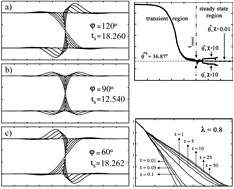 |
CSL focuses on two interdisciplinary areas: Electromigration and Mechanical Spectroscopy. Click on the links below for a description of each project.
Kinematics behavior of void motion is described in terms of instantaneous velocity and acceleration related to center of gravity. In the AVI format site, upper right corner figure shows position versus time plot similarly lower right corner figure gives acceleration versus time plot...
More Simulations...
|
|
|
|
Snap shuts from the void grain boundary interaction are presented, where only the capillary forces are taken into account. This figure shows that the void and grain boundary combine system starts to evolve towards the equilibrium configuration having proper dihedral angles dictated by thermostatic theory, as soon as they have in close contact with each others.
More Simulations... |
The interconnect having two fold symmetry, {110} Planes in FCC, with zero degree tilt angle θ=0 with respect to the electric field direction tends to transform the Gaussian hape edgevoid into the slit like shape stretched to the windward direction. Eventually, the tip of this slit type void breaks down and generates an internal void having various different in forms.
More Simulations... |
|
 |
Thermal grooving, effect of EM on grooving kinetics, cathode voiding and drifting...
One should try to select those materials for the underlayers that they can be able to modify the properties of the interfacial layers to obtain low specific surface Gibbs energies, high specific resistivity and diffusion coefficients.
More Simulations...
|
Selective Kink Decoration Model
The internal friction coefficients associated with the spread-out host interstitials as well as the decorator point defects were simulated using the discrete kink-chain model of dislocation damping.
Interactive Geometric Kink Model
The first dissipation regime, which occurs at low concentrations and low couplings, may be called as the dislocation induced Cottrell relaxation DICR (or dislocation enhanced Snoek relaxation, DESE) for spherical point defects. |
|
|
Application of Ogurtani theory to sintering. Check out preliminary results.
|
| |
|
|
 |

